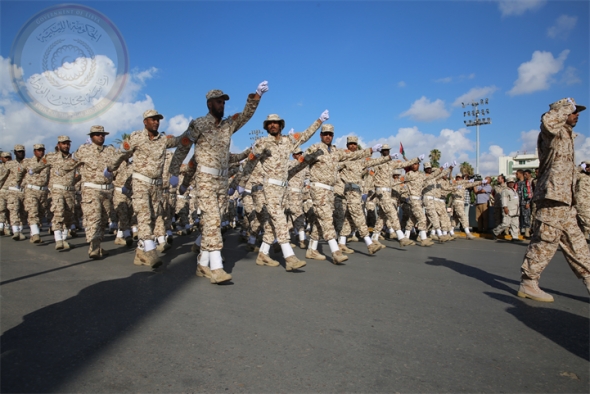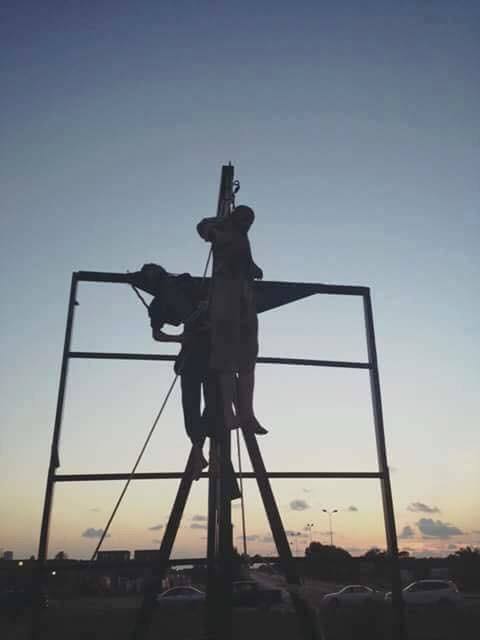By Mohamed A. Shiekhi.

Tripoli, 14 August 2015:
Some 500 to 600 Libyan army soldiers allied to Libya Dawn paraded yesterday in Tripoli’s Martyrs’ . . .[restrict]Square to commemorate the 75th anniversary of establishment of the Libyan army. However, the event drew widespread criticism from local residents who asked why it was parading in Tripoli and not fighting the Islamic State (IS/Daesh) in Sirte.
It was attended by General National Congress (GNC) president Nuri Abu Sahmain in his supposed capacity as commander-in-chief, Tripoli “prime minister” Khalifa Ghwell and Mustafa Laqlaib Tripoli’s justice minister.
A small, unidentified aircraft was seen flying overhead in what was taken to be a salute to the occasion.
As with the military parade in the same square on 8 July to mark the fourth anniversary of Tripoli liberation, the public ignored the ceremony although in his speech, Abu Sahmain addressed himself to “to the great Libyan people”.
Referring to his plans to reorganise the Libyan army into 11 brigades across the country, announced just before the July parade, he claimed that “the honorable people from Barqa [Cyrenaica] have called us to include them in the brigades”. As a result, three more brigades would be formed, he said – “one in Benghazi, one in Jebel Akhdar and one in Tobruk”. This, however, will not happen immediately, he added.
“These armed formations will be the guarantee of any upcoming government or political body,” he stated.
“We will not allow the army’s loyalty to any figure [a reference to General Khalifa Hafter] or political parties,” he said, stressing that Libya could not be rebuilt without army institutions”.
“Before signing any political agreement, we must ensure the rights of our army” he further said.
He did not say whether the value of Libya’s soldiers and officers would be reflected in a substantial salary hike. At present, a colonel in the army is said to earn less than a member of a militia member in the capital.
Not only ignored, the parade drew strong criticism from locals.
” I think it is pointless having a parade in Tripoli with such a large number of armed men while Sirte is now struggling and fighting Daesh militants,” 39-year-old downtown shop owner said.
“The Dawn government and the Congress must understand that they are involved in what is going on in Sirte now by ignoring the situation,” said anoither local. “I have a friend who lives in Sirte and he called me and said that the residents are fighting IS with only Kalashnikovs.”
“If Dawn insist that Tripoli is secure and everything is okay, why don’t they go and fight IS in Sirte,” commented another resident at a central Tripoli coffee shop. “They are Libyans, whether they are Qaddafi’s followers or not.”
Regarding the anniversary, the Royal Libyan Army was created on independence in 1951, But it was based on the former Cyrenaica Defence Force, itself created on 26 March 1943 out of the Libyan Arab Army, more commonly called the Senussi Force.
This latter was founded in Cairo during World War II by the Grand Senussi, Sayid Idris Al-Senussi, Emir of Cyrenaica (and after 1951, King of Libya) in cooperation with the British. Idris drew together exiles in Egypt and elsewhere.
In events remarkably similar to Libya’s present condition, the force, created at a meeting on 9 August 1940 chaired by Idris and a British colonel, was rejected by a group of Tripolitanian emigrés led by Ahmed Swehli. They refused to sign the resolution setting the army and instead tried to create a separate Tripolitanian army, asking the British to back it. The British responded by trying to bring the two sides together but, when that proved impossible, decided to ignore Swehli and stick purely with Idris.
On 9 August 1946, the anniversary of the founding of the Senussi Force was celebrated for the first time as a public holiday in Benghazi. [/restrict]









